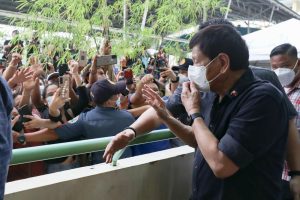Rodrigo Duterte’s presidency will come to an end on June 30, but he has been packing up his things at the Malacañang presidential palace since February. The country’s first president from Mindanao island will return to his home in Davao City where he served as mayor for nearly three decades.
Duterte was invited to be the anti-drug czar of the incoming Marcos government but his spokesperson said he is not keen on accepting the role. His executive secretary subsequently divulged that he is preparing to teach at a police academy in Davao. Duterte was a former prosecutor before his appointment as vice mayor in 1986.
Will Duterte turn his back on national politics and lead a quiet life in Davao? This is unlikely since he can still build and expand his clout even if he is based in Mindanao. His daughter is vice president for the next six years and is the presumed frontrunner in the 2028 presidential election. His personal aide is a senator until 2025 and is eligible to seek reelection. Duterte himself is qualified to run for an elected position in the next election.
Duterte can learn from what his predecessors did after the end of their term as president. Fidel Ramos retired in 1998 but he became part of the second People Power movement, which led to the ouster of his successor in 2001. After being deposed, Joseph Estrada was detained and convicted for plunder. He was later pardoned which allowed him to run again for president in 2010. He was placed second in the election, which reflected his enduring popularity despite his criminal conviction. He was elected mayor of the country’s capital Manila in 2013 and 2016.
Gloria Arroyo’s term as president ended in 2010 but she continued to be an elected official as congressional representative of her district in her home province of Pampanga. She even became speaker of the House of Representatives in 2018. After taking a one-term break, she ran unopposed as a district representative in the 2022 elections, which makes her the country’s only former president who currently holds an elected position. Benigno Simeon Aquino III retired after his presidency ended in 2016. He died in 2021 due to renal disease secondary to diabetes.
It is not far-fetched that the elder Duterte will join electoral politics again given his penchant for making contradictory decisions. His family occupies key positions in Davao and he will leave the office with a surprisingly high trust rating. He even considered running for vice president and senator in the 2022 elections. He has three years to rethink the option of running again for either a local or national position.
Meanwhile, his Cabinet members have been actively promoting the achievements of his administration. A recent two-day summit touting the legacy of the Duterte presidency featured several Cabinet members and highlighted key reforms implemented in the last six years such as Universal Health Care Law, Universal Access to Quality Tertiary Education, Bangsamoro Organic Law, anti-illegal drugs campaign, and migrant workers’ protection. The government spokesperson also announced that a book will soon be launched compiling Duterte’s outstanding accomplishments as leader of the nation. This claim is the opposite of what Duterte admitted earlier about having “nothing” to show once he steps down from power. The summit was also silent on the failure of Duterte to fulfill his main campaign platform of adopting federalism.
It is also odd that the Cabinet mentioned the anti-illegal drugs campaign as part of Duterte’s achievements since the president has repeatedly pointed out that the drug menace remains a serious social problem. The campaign also became notorious after it led to rampant human rights violations. In fact, Duterte will be the country’s first president who will leave office while facing a pending investigation at the International Criminal Court for his role in the bloody enforcement of the campaign. The stigma of being accused of committing grave crimes against humanity will persist even if he chose to return to Davao.
Duterte may take comfort in the fact that an ally will be his successor and his children have strategic positions in government, but it is no guarantee that he will have a peaceful semi-retirement in Davao. Two former presidents were detained after being charged with the non-bailable offense of plunder. Duterte will soon lose his presidential immunity to civil and criminal suits which means opposition groups can now file charges against him to seek accountability, not just for the extrajudicial killings under his term but also for the alleged plunder that tainted the government’s pandemic response.

































